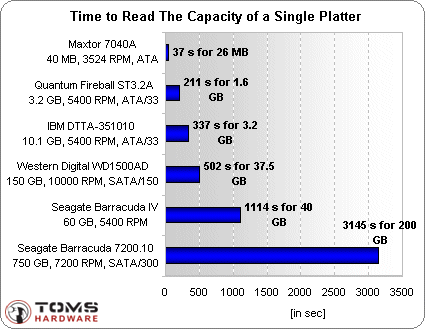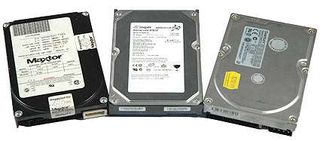15 Years Of Hard Drive History: Capacities Outran Performance
Time Required To Write A Full Platter

If you have a look at these results, it becomes obvious that while absolute hard drive performance may have increased impressively, but the performance relative to hard drive capacity has decreased dramatically. From this standpoint, today's hard drives aren't as quick as old ones! Consider:
The 1991 40 MB hard drive took 37 seconds to read the capacity of one platter (26 MB).
The 1998 3.2 GB hard drive took 3 minutes and 31 seconds to read the capacity of one platter (1.6 GB).
The 1999 10 GB hard drive took 5 minutes and 37 seconds to read the capacity of one platter (3.2 GB).
The 2004 60 GB hard drive took 18 minutes and 34 seconds to read the capacity of one platter (40 GB).
The 2006 750 GB hard drive took 52 minutes to read the capacity of one platter (200 GB).
Of course this comparison is very simplified and doesn't take other factors into account, like platter count and diameter, rotation speed and average file size. Results will also vary if you take other hard drives and different capacity points. But the overall message is the same: the time it takes to fully read or write from or to a hard drive has gone up substantially in the last 15 years.

Acquiring and merging also hit the HD market. Maxtor bought Quantum some years ago and by the end of 2006 Seagate will finish its acquisition of Maxtor.
Stay on the Cutting Edge
Join the experts who read Tom's Hardware for the inside track on enthusiast PC tech news — and have for over 25 years. We'll send breaking news and in-depth reviews of CPUs, GPUs, AI, maker hardware and more straight to your inbox.
Current page: Time Required To Write A Full Platter
Prev Page Performance Analysis Next Page Why Is Hard Drive Performance Crucial?-
There is a typo in the article:Reply
Quantum's Fireball was available about five years after the 40 GB Maxtor drive discussed above,
It should be 40MB, obviously -
badcat "And Samsung, finally, may have a decent advantage in the future with a possible hybrid hard drive; it is the only firm in this quartet that manufactures both magnetic and Flash storage." WRONG! This technology existed in enterprise level hard disks for some time now.Reply
Most Popular

